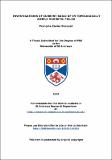Investigations of current build up in topologically simple magnetic fields
Abstract
The solar corona is a highly conductive plasma which is dominated by the coronal magnetic field. Observations show that important solar phenomena like flares or the heating of the corona are driven by magnetic energy, probably through the process of magnetic reconnection. The release of magnetic energy by reconnection requires that non-ideal processes take place in contradiction to the high conductivity of the corona. One possibility to overcome this problem is to generate strong electrical currents in strongly localised regions. In this thesis we investigate how such localised currents can be formed by slow ideal evolution of topologically simple magnetic fields. To this purpose numerical simulations are carried out using an Eulerian and a Lagrangian MHD relaxation code. We first use a simple example (twisting of a uniform field) to investigate the advantages and disadvantages of both codes and to discover possible limitations for their application. We show that for the problems addressed in this thesis the Lagrangian code is more suited because it can resolve the localised current densities much better than the Eulerian code. We then focus in particular on magnetic fields containing a so-called Hyperbolic Flux Tube (HPT). A recently proposed analytical theory predicts that HFT’s are sites where under certain conditions strong current build-up can be expected. We use our code to carry out a systematic parametric study of the dependence of current growth for a typical HFT configuration. We have also developed a completely new version of the analytical theory which is directly based on the set-up of our numerical simulations. We find that the simulations agree with the analytical prediction in a quantitative way but that the analytical theory underestimates the current growth quite substantially, probably by not taking into account the non-linear character of the full problem.
Type
Thesis, PhD Doctor of Philosophy
Collections
Items in the St Andrews Research Repository are protected by copyright, with all rights reserved, unless otherwise indicated.

